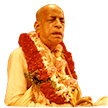Transcendental Bliss - an essential subject: Difference between revisions
(Created page with "Category:Essential Subjects <!----------------------- edit below this line -----------------------> <!------------------------ begin introduction text below --------------...") |
(Vanibot #0041: Moves Choose Another box to the end) |
||
| Line 2: | Line 2: | ||
<!----------------------- edit below this line -----------------------> | <!----------------------- edit below this line -----------------------> | ||
<!------------------------ begin introduction text below ------------------------> | <!------------------------ begin introduction text below ------------------------> | ||
The impersonalists, meditating upon the impersonal Brahman and feeling some transcendental bliss. And Śukadeva Gosvāmī says the source of that transcendental bliss is here, Kṛṣṇa. Ahaṁ sarvasya prabhavaḥ (BG 10.8). Kṛṣṇa is the source of everything. Therefore the transcendental bliss which the impersonalists try to experience by meditating upon impersonal Brahman, Śukadeva Gosvāmī says: itthaṁ satāṁ brahma-sukhānubhūtyā (SB 10.12.11). Brahma-sukham, the transcendental bliss of realization of Brahman. Dāsyaṁ gatānāṁ para-daivatena. Here is the person who is the source of brahma-sukha and dāsyaṁ gatānāṁ para-daivatena. Dāsyaṁ gatānām means devotees. A devotee is always prepared to render service to the Lord. | |||
Srila Prabhupada's books, lectures, conversations and letters offer a comprehensive presentation of this essential subject as seen in the Vaniquotes '''[[Vaniquotes:Category:Transcendental Bliss|Transcendental Bliss]]''' category. An introduction from his books is given below in the following | Srila Prabhupada's books, lectures, conversations and letters offer a comprehensive presentation of this essential subject as seen in the Vaniquotes '''[[Vaniquotes:Category:Transcendental Bliss|Transcendental Bliss]]''' category. An introduction from his books is given below in the following 10 quotes. | ||
<!-------- end introduction text and don't touch next three lines ---------> | <!-------- end introduction text and don't touch next three lines ---------> | ||
== Quotes from Srila Prabhupada's books == | |||
<!----------------- edit quote boxes below this line -----------------> | |||
{{VaniQuotebox|A devotee of Krsna is never in a miserable condition, nor does he have any desire other than to serve Krsna. He is experienced and advanced. He feels the transcendental bliss of love of Krsna and always engages in His service in full perfection|A devotee of Kṛṣṇa is never in a miserable condition, nor does he have any desire other than to serve Kṛṣṇa. He is experienced and advanced. He feels the transcendental bliss of love of Kṛṣṇa and always engages in His service in full perfection. '''(Caitanya-caritāmṛta, Madhya-līlā 24.182)'''}} | |||
{{VaniQuotebox|A Vaisnava is always firmly situated in transcendental bliss because of engagement in devotional service|A Vaiṣṇava is always firmly situated in transcendental bliss because of engagement in devotional service. Although he may appear to suffer material pains, his position is called transcendental bliss in separation (viraha). The emotions a lover and beloved feel when separated from one another are actually very blissful, although apparently painful. Therefore the separation of Lord Rāmacandra from Sītādevī, as well as the consequent tribulation they suffered, is but another display of transcendental bliss. '''(Śrīmad-Bhāgavatam 5.19.5)'''}} | |||
{{VaniQuotebox|Actual knowledge of transcendental bliss can be bestowed upon anybody by a pure devotee. One cannot attain the perfection of spiritual life simply by following the directions of the Vedas. One has to approach a pure devotee|One cannot attain the perfection of spiritual life simply by following the directions of the Vedas. One has to approach a pure devotee: anyābhilāṣitā-śūnyaṁ jñāna-karmādy-anāvṛtam (CC Madhya 19.167). By the grace of such a devotee, one can understand the Absolute Truth, Kṛṣṇa, and one's relationship with Him. A materialistic person sometimes thinks that simply by executing pious activities and remaining at home one can understand the Absolute Truth. '''(Śrīmad-Bhāgavatam 5.12.12)'''}} | |||
{{VaniQuotebox| | |||
{{VaniQuotebox| | {{VaniQuotebox|Being situated in the spiritual world is certainly pleasurable, but those who realize the transcendental name, form, qualities and pastimes of Lord Krsna enjoy transcendental bliss many times more than one who has simply realized the self|When one understands that he belongs not to the material world but to the spiritual world, one is called liberated. Being situated in the spiritual world is certainly pleasurable, but those who realize the transcendental name, form, qualities and pastimes of Lord Kṛṣṇa enjoy transcendental bliss many times more than one who has simply realized the self. When one is situated on the platform of self-realization, he can certainly be easily attracted by Kṛṣṇa and become a servant of the Lord. '''(Caitanya-caritāmṛta, Madhya-līlā 17.137)'''}} | ||
{{VaniQuotebox| | {{VaniQuotebox|Everything that is in the spiritual world is full of transcendental bliss, including the form, body, place and paraphernalia of the Lord. All are eternally cognizant and blissful|Everything that is in the spiritual world is full of transcendental bliss, including the form, body, place and paraphernalia of the Lord. All are eternally cognizant and blissful. It is not the fault of the Ācārya Śaṅkara that he has so interpreted Vedānta, but if someone accepts it, then certainly he is doomed. Anyone who accepts the transcendental body of the Personality of Godhead as something mundane certainly commits the greatest blasphemy. '''(Śrīmad-Bhāgavatam, Introduction)'''}} | ||
{{VaniQuotebox| | {{VaniQuotebox|In the absolute realm everything is transcendental bliss|"The Māyāvādīs are offenders at the lotus feet of Kṛṣṇa, although they utter always brahma, ātmā, or caitanya, etc. And because they are offenders at the lotus feet of Kṛṣṇa, they are actually unable to utter the holy name of Kṛṣṇa. The name Kṛṣṇa and the Personality of Godhead Kṛṣṇa are identical. There is no difference in the absolute realm between the name, form or person of the Absolute Truth because in the absolute realm everything is transcendental bliss. '''(Śrīmad-Bhāgavatam, Introduction)'''}} | ||
{{VaniQuotebox| | {{VaniQuotebox|In the material world, theft is criminal, but in the spiritual world the Lord's stealing is a source of transcendental bliss|In the material world, theft is criminal, but in the spiritual world the Lord's stealing is a source of transcendental bliss. Mundane rascals, who cannot understand the absolute nature of the Personality of Godhead, sometimes call Lord Śrī Kṛṣṇa immoral, but they do not know that His seemingly immoral activities, which are not kept secret, afford pleasure to the devotees. '''(Caitanya-caritāmṛta, Madhya-līlā 4.133)'''}} | ||
{{VaniQuotebox| | {{VaniQuotebox|Negation of the variegatedness of the inferior energy does not necessitate negation of the positive transcendental bliss of the spiritual world. Therefore the Lord's gentleness, His smile, His character and everything related to Him are all transcendental|Negation of the variegatedness of the inferior energy does not necessitate negation of the positive transcendental bliss of the spiritual world. Therefore the Lord's gentleness, His smile, His character and everything related to Him are all transcendental. Such manifestations of the internal potency are the reality, of which the material shadow is only a temporary representation from which everyone with proper knowledge must be detached. '''(Śrīmad-Bhāgavatam 3.3.20)'''}} | ||
{{VaniQuotebox| | {{VaniQuotebox|One cannot enjoy material illusory prosperity if he desires to return home, back to Godhead. One who has no information of the transcendental bliss in the association of the Lord foolishly desires to enjoy this temporary material happiness|One cannot enjoy material illusory prosperity if he desires to return home, back to Godhead. One who has no information of the transcendental bliss in the association of the Lord foolishly desires to enjoy this temporary material happiness. In the Caitanya-caritāmṛta it is said that if someone sincerely wants to see the Lord and at the same time wants to enjoy this material world, he is considered to be a fool only. One who wants to remain here in the material world for material enjoyment has no business entering into the eternal kingdom of God. '''(Śrīmad-Bhāgavatam 2.9.23)'''}} | ||
{{VaniQuotebox| | {{VaniQuotebox|One must first become a pure devotee of Lord Krsna. Only then can one enjoy hearing the songs of Jayadeva and relish transcendental bliss|Lord Śiva drank an ocean of poison, but one should not imitate this. One must first become a pure devotee of Lord Kṛṣṇa. Only then can one enjoy hearing the songs of Jayadeva and relish transcendental bliss. If one simply imitates the activities of Lord Śiva and drinks poison, one will certainly meet with death. '''(Caitanya-caritāmṛta, Madhya-līlā 8.250)'''}} | ||
<!----------------- edit quote boxes above this line -----------------> | <!----------------- edit quote boxes above this line -----------------> | ||
| Line 28: | Line 33: | ||
'''Transcendental Bliss - [[Vaniquotes:Category:Transcendental Bliss|explore more within this category]]'''. | '''Transcendental Bliss - [[Vaniquotes:Category:Transcendental Bliss|explore more within this category]]'''. | ||
{{EsentialSubjectTotal}} | {{EsentialSubjectTotal}} | ||
<div style="float:left;"> | |||
{{EssentialSubjectnav}} | |||
</div> | |||
__NOTOC__ | __NOTOC__ | ||
__NOEDITSECTION__ | __NOEDITSECTION__ | ||
Latest revision as of 17:56, 22 November 2020
The impersonalists, meditating upon the impersonal Brahman and feeling some transcendental bliss. And Śukadeva Gosvāmī says the source of that transcendental bliss is here, Kṛṣṇa. Ahaṁ sarvasya prabhavaḥ (BG 10.8). Kṛṣṇa is the source of everything. Therefore the transcendental bliss which the impersonalists try to experience by meditating upon impersonal Brahman, Śukadeva Gosvāmī says: itthaṁ satāṁ brahma-sukhānubhūtyā (SB 10.12.11). Brahma-sukham, the transcendental bliss of realization of Brahman. Dāsyaṁ gatānāṁ para-daivatena. Here is the person who is the source of brahma-sukha and dāsyaṁ gatānāṁ para-daivatena. Dāsyaṁ gatānām means devotees. A devotee is always prepared to render service to the Lord.
Srila Prabhupada's books, lectures, conversations and letters offer a comprehensive presentation of this essential subject as seen in the Vaniquotes Transcendental Bliss category. An introduction from his books is given below in the following 10 quotes.
Quotes from Srila Prabhupada's books
Transcendental Bliss - explore more within this category.
Vanipedia has now over 903 introductory articles compiled from Srila Prabhupada's books under the series titled Essential Subjects. All these articles can be seen in the Table of Content on the right side of this article and also here in this Umbrella Category. Browse through them to relish the breadth and depth of Srila Prabhupada's teachings - There is a subject for everyone.









